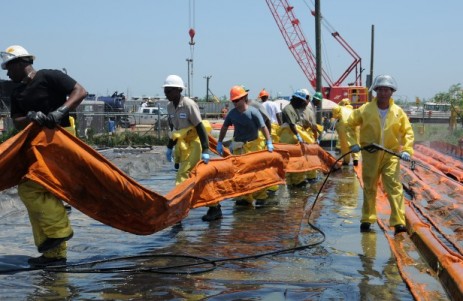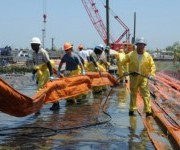 Working to clean up the Gulf oil spill
Working to clean up the Gulf oil spill
Cross-posted from NRDC’s Simple Steps blog.
Venice, La. – “You shoulda been out here last evening” said Carey, the shrimp boat captain who took me out to South Pass today. He saw that I was taking air samples with a hand-held monitoring device, and recounted the strong smell and choking fumes he had suffered through yesterday when he went out to rescue a stranded boat in the Main Pass channel. “Those guys on that boat had it worse than me” he added. “They were pretty sick – headaches and sick to their stomachs – but they had been sitting out there stranded in that stuff for two hours.”
At noon on a sunny day with a light wind from the southeast, I only found traces of volatile organic compounds in the air and noticed only a hint of a petroleum smell. But I could imagine how it had been the night before.
Captain Carey is making a little money taking reporters and environmentalists out to look for oil along the Louisiana coastline near Venice. Many of his friends have taken a different job. They are out there cleaning up the oil.
I talked with some of them this weekend, the night before they headed out to start dragging boom. They described the safety training they got from BP, and showed off the containment boom, absorbant boom, and large absorbant pads they were supposed to drag behind their boats.
“It’ll be like sweeping the State of Texas with a broom” one said.
“It’s just to make people feel better and to make it look like BP is doing something,” another added.
“But at least they’re paying us well.”
Then they showed me the protective equipment they had received: hard hats, safety glasses, coveralls, and gloves. “These are just for the guys who are pulling in the boom. Not for the boat captains” one captain explained.
“Where are the respirators?” I asked.
“Respirators? They didn’t give us any”
“Did they explain why not?”
“They said all the chemicals in the air dissipate within a few hours, and we’ll be in areas where the oil has been there for a while, so all the vapors will have gone away. Nothing to worry about.”
I checked the BP website, Coast Guard website, NOAA website, and EPA website. No data on air levels of volatile organic compounds (VOCs) offshore. I guess we’re supposed to take it on faith that it’s safe out there.
That’s why I’m out here today with an air monitor.
I don’t expect to find anything; I hope I won’t find anything. But it’s always best to check.
The problem is that we can’t get all the way out to the areas where the fishermen are working — a lot of those areas are closed off, plus we’re in a small boat and the sea is rough in the Gulf today. In addition, I realize that we’re still far from the spill, and in the heat of mid-day, the vapors are probably going straight up, not hugging the ocean like they might do in the cool of the evening.
But I still found VOC vapors out there.
Maybe I’ll need to go back soon.



